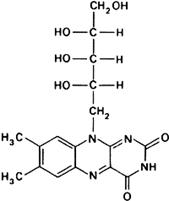Monographs: Pharmaceutical substances: Riboflavin (Riboflavinum)
Molecular formula. C17H20N4O6
Relative molecular mass. 376.4
Graphic formula.

Chemical name. 7,8-Dimethyl-10-(D-ribo-2,3,4,5-tetrahydroxypentyl)isoalloxazine; CAS Reg. No. 83-88-5.
Description. A yellow to orange-yellow, crystalline powder; odourless or almost odourless.
Solubility. Very slightly soluble in water; practically insoluble in ethanol (~750 g/l) TS, ether R, and acetone R.
Category. Vitamin.
Storage. Riboflavin should be kept in a tightly closed container, protected from light.
Additional information. Riboflavin has a bitter taste. Solutions of Riboflavin, especially in dilute solutions of alkalis, deteriorate rapidly when exposed to light.
Requirements
Definition. Riboflavin contains not less than 98.0% and not more than 102.0% of C17H20N4O6, calculated with reference to the dried substance.
Identity tests
A. Carry out the examination as described under 1.7 Spectrophotometry in the infrared region. The infrared absorption spectrum is concordant with the spectrum obtained from riboflavin RS or with the reference spectrum of riboflavin.
B. Dissolve 1 mg in 100 mL of water. The solution has a pale greenish yellow colour by transmitted light and an intense yellowish green fluorescence by reflected light. The addition of mineral acids or alkalis destroys the fluorescence.
Sulfated ash. Not more than 3.0 mg/g.
Loss on drying. Dry to constant weight at 105°C; it loses not more than 15 mg/g.
Lumiflavin. Shake 25 mg with 10 mL of ethanol-free chloroform R for 5 minutes and filter. Measure the absorbance of the filtrate in a 1-cm layer at the maximum at about 440 nm against a solvent cell containing ethanol-free chloroform R; the absorbance does not exceed 0.025 (preferably use 2-cm cells for the measurement and calculate the absorbance of a 1-cm layer).
Assay
• Carry out the operations in subdued light.
To about 0.075 g, accurately weighed, add 5 mL of water to ensure that the substance is completely wetted. Then add 5ml of sodium hydroxide (~80 g/l) TS. As soon as this is completely dissolved, add 100 mL of water and 2.5 mL of glacial acetic acid R, and sufficient water to produce 1000 mL. To 10 mL of this solution, add 1ml of sodium acetate (50 g/l) TS and sufficient water to produce 50 mL. Measure the absorbance of a 1-cm layer of the diluted solution at the maximum at about 444nm. Calculate the amount of C17H20N4O6 in the substance being tested by comparison with riboflavin RS, similarly and concurrently examined.